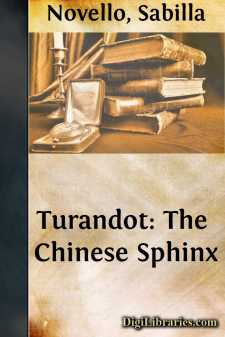Categories
- Antiques & Collectibles 13
- Architecture 36
- Art 48
- Bibles 22
- Biography & Autobiography 813
- Body, Mind & Spirit 142
- Business & Economics 28
- Children's Books 17
- Children's Fiction 14
- Computers 4
- Cooking 94
- Crafts & Hobbies 4
- Drama 346
- Education 46
- Family & Relationships 57
- Fiction 11829
- Games 19
- Gardening 17
- Health & Fitness 34
- History 1377
- House & Home 1
- Humor 147
- Juvenile Fiction 1873
- Juvenile Nonfiction 202
- Language Arts & Disciplines 88
- Law 16
- Literary Collections 686
- Literary Criticism 179
- Mathematics 13
- Medical 41
- Music 40
- Nature 179
- Non-Classifiable 1768
- Performing Arts 7
- Periodicals 1453
- Philosophy 64
- Photography 2
- Poetry 896
- Political Science 203
- Psychology 42
- Reference 154
- Religion 513
- Science 126
- Self-Help 84
- Social Science 81
- Sports & Recreation 34
- Study Aids 3
- Technology & Engineering 59
- Transportation 23
- Travel 463
- True Crime 29
Turandot: The Chinese Sphinx
by: Sabilla Novello
Description:
Excerpt
SCENE.—Outskirts of Peking. L. View of town gate, above which are reared long poles, bearing turbaned and shorn heads, symmetrically disposed so as to form a kind of architectural ornament. R. Small suburban dwellings, from one of which issues PRINCE KALAF, dressed in a fantastic Tartar warrior's costume.
KALAF.
The Gods be thanked, at last by patient seeking,
I've found a lodging in this crowded Peking.
(Enter BARAK, in Persian costume; sees KALAF and starts, surprised.)
BARAK.
Prince Kalaf? 'tis not possible. He's dead!
Yet, sure 'tis he—his eyes—his legs—his head,—
My Lord!
KALAF.
What—Barak! here—alive?
BARAK.
And kicking.
But how escaped you from that fatal licking
The Bey of Tefflis gave us all in battle?
Your father's troops were slaughtered off like cattle,
And you, my Prince, we thought, were slain or taken;
So off I fled to save, at least, my bacon.
I found a refuge in this queer old city;
A widow married me for love—or pity.
We live like happy doves in yonder cot,—
My only grief,—the thought of your sad lot.
KALAF.
We never thought to meet again, dear Tutor,—
In China too!
BARAK.
For years I've taken root here.
But, dearest Prince, how was it, tell me, pray,
You 'scaped the perils of that dreadful day?
KALAF.
Breathe not my name! A price is on my head;
I've roamed from land to land; have toiled for bread.
As slave I served the Shah of Keicobad;
This King a fair and gracious daughter had,
Who guessed my birth, and offered me her heart.
Her haughty father bade me quick depart;
With horse and arms he furnished me. I'm here
T' enlist myself as Chinese volunteer;
I hope to serve the Son of Moon and Stars
In some crack regiment of Light Hussars.
But what's the meaning of the crowds that flood
Each caravanserah? Refused I stood
By all, till in yon house I found, at least
Accommodation for myself and beast.
BARAK.
In that trim cottage lives my wife. 'Tis lucky
She proved herself in house-letting so plucky.
KALAF.
I give you joy, old friend; you're married snugly,
Your wife (for a Chinese) is not so ugly,
And kind as kind can be, though somewhat droll,
Adieu,—I'll through the city take a stroll.
And then proceed to visit the great Khan,
And beg him to engage me as his man.
BARAK.
Stay, Prince, how rash!—you do not know your danger:
'Tis evident to Peking you're a stranger.
To-day a horrid deed will be enacted,—
A cruel death, by Turandot exacted.
Have you not heard that Turandot the fair
Has filled this land with bloodshed and despair?
KALAF.
'Tis true I heard, in distant Keicobad,
Accounts of Turandot, so strange, so sad,
That I believed them false,—exaggerated.
'Twas said the Prince of Keicobad, ill-fated,
Had met his death by Turandot's command;
His father, in revenge, assailed this land,
But lost his life; my patroness, his daughter,
By chance escaped unhurt the gen'ral slaughter,
And slave was made to haughty Turandot:
All this I heard, but credited it not.
BARAK.
Too true is all you've heard through common rumour,
The Princess Turandot's ferocious humour
Has many princes caused to lose their life
In seeking to obtain her as a wife....


